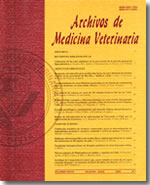Esophagus-diaphragmatic Cardioplasty for the treatment of the idiopathic congenital total megaesophagus in dogs
Main Article Content
Abstract
The "idiopathic congenital total megaesophagus" (I.C.T.M.) in dogs corresponds to a congenital alteration of the esophagus, of unknown origin, characterized by producing paresis or even complete esophagus paralysis. This alteration of the food transit (stasis) produces passive dilatation of the esophagus in all its passage and esophagitis due to fermentation.
Clinically this state is characterized by producing a "regurgitation syndrome" due to an insufficient transit at the esophagus level, with severe nutritional and growth alterations in the affected puppies, and recurrent pneumonia by aspiration".
The prognosis of the cubs affected by this disease is unfavorable since the medical as well as the surgical treatments of this disease, show very poor results until now, establishing a mortality of the 74% in the first year of life.
In the present work, the author proposes a surgical technique called "cardioplasty esophagus-diaphragmatic", that redress artificially the paralysis of the final thoracic portion of the esophagus and of the cardias, through the contractile activity of the diaphragm during the respiratory cycles.
This technique has been used in ten young dogs with I.C.T.M., with positive results in 9 of them and recovery of the nutritional state of the cub. Only one of the puppies died in the postoperatory period, without showing improvement in the esophagus transportation.

